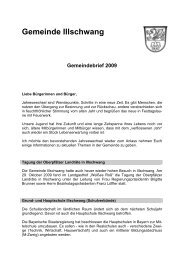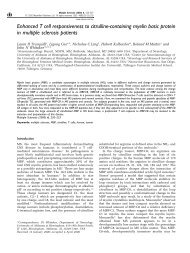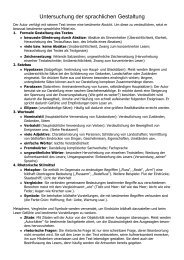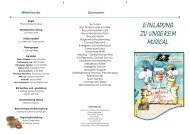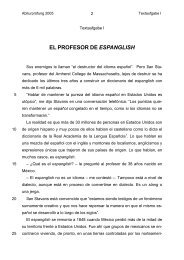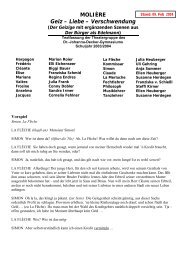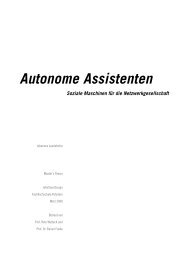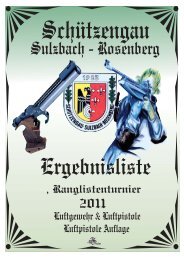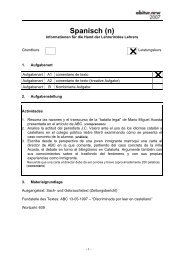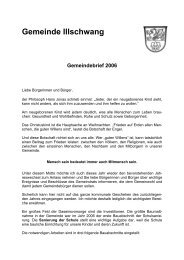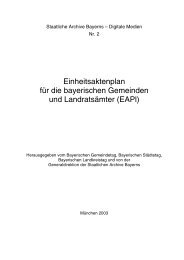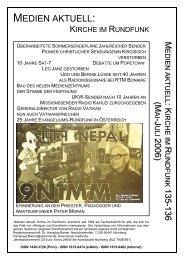Pathfinder Chronicles - Gazetteer - Asamnet
Pathfinder Chronicles - Gazetteer - Asamnet
Pathfinder Chronicles - Gazetteer - Asamnet
You also want an ePaper? Increase the reach of your titles
YUMPU automatically turns print PDFs into web optimized ePapers that Google loves.
<strong>Pathfinder</strong> <strong>Chronicles</strong><br />
14<br />
two levels the paladin has attained. A Fortitude save (DC<br />
10 + 1/2 the paladin’s level + the paladin’s Cha modifier)<br />
halves this damage. A paladin may use the light of purity<br />
one additional time per week for every three additional<br />
levels he has attained, to a maximum of five times at<br />
18th level.<br />
Ranger<br />
Rangers are a common sight in many rural communities,<br />
from the town trapper to the scout for the local militia.<br />
These woodsmen are especially prevalent in the heart<br />
of Avistan, where their blend of tracking and woodland<br />
survival skills is in high demand. Much has fallen to the<br />
wild in the years since the collapse of Cheliax, and rangers<br />
are often needed to scout out areas that once were tame.<br />
While many rangers work alone or in small independent<br />
groups, it is becoming more and more common for rangers<br />
to join up with various military orders as professional<br />
scouts and forward observers.<br />
Appearance: Rangers tend to dress in a manner<br />
functional to their current environment: furs and<br />
heavy coats for colder climates to light leathers and airy<br />
cloaks for warm areas. These outfits are often colored<br />
so as to blend in with the local f lora. Some rangers even<br />
go so far as to work plants into their outfits. The often<br />
ragged and unkempt appearance of rangers leads many to<br />
believe that they are wild folk who are not to be trusted.<br />
Rangers who belong to organized scout units tend to carry<br />
documentation to prove their affiliation.<br />
Nations: Although Molthune, Kyonin, Andoran, and<br />
many of the River Kingdoms feature rangers heavily in<br />
their armies, none are so elite as those from the Fangwood<br />
of Nirmathas. These vigilant woodsfolk often oppose the<br />
machinations of the druidic Wildwood Lodge, who sponsor<br />
rangers of their own. Most rangers prefer solitude to<br />
fraternity, living secluded lives as trappers,<br />
mountain hermits, and wild men.<br />
Class Abilities: Rangers who join a military unit<br />
sometimes find it difficult to keep a more exotic animal<br />
companion and instead choose a different path. These<br />
rangers focus their training on a single animal, to the<br />
exclusion of all others, forming a tight bond. This ability<br />
replaces the wild empathy ability.<br />
Enhanced Companion (Ex): Upon gaining an animal<br />
companion at 4th level, the ranger must choose a single<br />
type of animal. The ranger cannot call a different animal<br />
companion. The ranger’s effective druid level is equal to<br />
the ranger’s level –2 (instead of the normal 1/2) for that<br />
type of animal. This animal must be on the basic list of<br />
companions that can be chosen at 4th level and cannot<br />
be changed.<br />
Rogue<br />
Wherever there are traps to be disarmed, guards to sneak<br />
past, and treasure to be looted, a rogue most likely lurks<br />
nearby. Rogues thrive in every city and most towns,<br />
operating freely or as part of a larger guild or organization.<br />
While most common folk would rather the local thief<br />
swing from a gibbet, such scoundrels represent only a<br />
fraction of those belonging to the rogue class. Many find<br />
honest work as part of the local militia, as covert spies, or<br />
even as guards. Others prefer to work freelance, taking on<br />
the role of adventurer to recover stolen property, explore<br />
dangerous dungeons, or capture fugitives. A good number<br />
of rogues indeed turn to a life of crime, stealing from the<br />
rich and poor alike, either alone or as part of a dangerous<br />
thieves’ guild.<br />
Appearance: Rogues with a job tend to dress in the garb<br />
of their profession. Those who work freelance dress like<br />
everyone else to blend in. Sometimes this might require<br />
the finest silks, while other occasions call for muddy<br />
wool—it all depends on the job.<br />
Ulfen<br />
Millennia of trading and ocean raiding brought the seed of the ruddy, pale-skinned inhabitants<br />
of the Lands of the Linnorm Kings to all corners of Avistan. About 2,000 years ago, armadas of<br />
dragon-headed longships emerged from the Steaming Sea to make war and to pillage eastern<br />
Avistan’s coastline, forever changing the course of history and the bloodlines of countless nations.<br />
These raids have decreased significantly in the last several centuries, especially since<br />
Cheliax’s domination of the Arch of Aroden, gateway to the lucrative Inner Sea. Still, the<br />
Ulfen retain a reputation for seamanship and ruthlessness in battle that predates the<br />
recorded history of most Avistani nations.<br />
Ulfen men wear their blond, light brown, or red hair long, sometimes in<br />
simple braids. Men commonly wear beards. Women take braidwork much<br />
more seriously, weaving their hair into symbolic designs of artistic,<br />
representational, and sentimental value. Most pureblood Ulfen speak Skald,<br />
the tongue of their homeland.



